英语考试资料 高校长我CET4、CET6常用句型.
备考4、6级经典句型

1. It作先行主语和先行宾语的一些句型She had said what it was necessary to say.2. 强调句型It is not who rules us that is important, but how he rules us.3. "All+抽象名词"或"抽象名词+itself"(very+形容词)He was all gentleness to her.4. 利用词汇重复表示强调A crime is a crime a crime.5. "something(much)of"和"nothing(little)of""something of"相当于"to some extent",表示程度。
在疑问句或条件从句中,则为"anything of",可译为"有点","略微等。
""译为毫无","全无"。
"much of"译为"大有","not much of"可译为"算不上","称不上","little of"可译为"几乎无"。
something like译为"有点像,略似。
"They say that he had no university education, but he seems to be something of a scholar.6. 同格名词修饰是指of前后的两个名词都指同一个人或物,"of"以及它前面的名词构一个形容词短语,以修饰"of"后面的那个名词。
大学英语四六级等级考试强调句
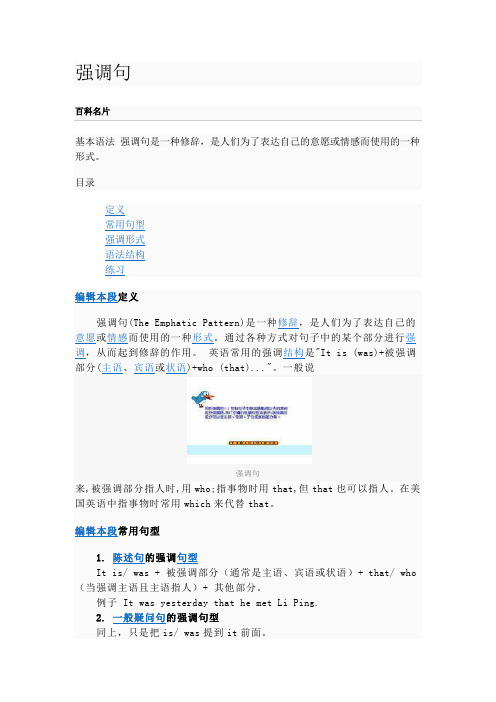
强调句百科名片基本语法强调句是一种修辞,是人们为了表达自己的意愿或情感而使用的一种形式。
目录定义常用句型强调形式语法结构练习编辑本段定义强调句(The Emphatic Pattern)是一种修辞,是人们为了表达自己的意愿或情感而使用的一种形式。
通过各种方式对句子中的某个部分进行强调,从而起到修辞的作用。
英语常用的强调结构是"It is (was)+被强调部分(主语、宾语或状语)+who (that)..."。
一般说强调句来,被强调部分指人时,用who;指事物时用that,但that也可以指人。
在美国英语中指事物时常用which来代替that。
编辑本段常用句型1. 陈述句的强调句型It is/ was + 被强调部分(通常是主语、宾语或状语)+ that/ who (当强调主语且主语指人)+ 其他部分。
例子 It was yesterday that he met Li Ping.2. 一般疑问句的强调句型同上,只是把is/ was提到it前面。
例子 Was it yesterday that he met Li Ping?3. 特殊疑问句的强调句型被强调部分(通常是疑问代词或疑问副词)+ is/ was + it + that/ who + 其他部分?例子 When and where was it that you were born?4.not … until …句型的强调句A. 句型为:It is/ was not until + 被强调部分 + that + 其他部分普通句:He didn't go to bed until/ till his wife came back.强调句:It was not until his wife came back that he went to bed.B. 注意:此句型只用until,不用till。
但如果不是强调句型,till, until可通用;因为句型中It is/ was not ... 已经是否定句了,that后面的从句要用肯定句,切勿再用否定句了。
四六级考试中的必考短语和句式精选全文

可编辑修改精选全文完整版1. in advance 提前2.Give priority to 优先…3.Figure out 找出4.Broken down 抛锚5.Twist the meaning 扭曲意思6.Theater剧院/comedy喜剧/romantic story爱情故事/thriller惊悚片/tragedy悲剧/horror movie 恐怖电影7.The shows are not so entertaining. 表演不是那么的有趣。
8.Seasick 晕船/express way 高速公路/9.Sick 恶心10.Paying off 有了回报y off 解雇12.Headlines 头条,新闻报道(我爱KK)13.Economic forum 经济论坛14.For here or to go 在这儿吃还是打包带走;15.I have to watch my weight.小心体重16.They look pretty done.菜已经很熟了。
17.I can’t feel my arm. 我的手麻了。
18.My legs are fallen sleep 我的脚麻了19.Lucid thought 清醒的思维20.To pull strings连在一起,就是通过重要人物,在幕后操纵,在幕后牵线21.Go for registration of a course 注册课程(选课)22.The jacket of the book 书皮23.Sleeping compartment 卧铺24.Do the sight-seeing 观光25.Parking lot 停车场26.Get the prescription filled取药27.Take a year off 休假一年28.It is still a mystery to sb. 对某人而言,这依然是个迷。
29.get upset 变得烦躁30.not really!情况不是这样的31.I think you’d better… 建议句型;32.I am enrolled in… 我参加了…= I take part in…33.I am told that… 听说…(下雨天音乐和巧克力才更配哦.)= I hear that…(peo ple often take chocolate or flowers when they go to dinner at someone’s house.)34.I am afraid that… 恐怕(表示推测)=I think…35.I’d rather… 表达观点36.I made reservations for… 我预定了…37.I would die to have a chance to meet Kevin Kelly. 我愿意不惜一切代价去见KK.38.I got Kevin to do it. 我让kevin去做了。
英语四六级句型知识点

英语四六级句型知识点1.主语 + 谓语 + 宾语(SVO):这是英语中最基本的句型结构,如:She eats an apple.(她吃一个苹果。
)2.主语 + 谓语 + 间接宾语 + 直接宾语(SVOO):在这种句型中,直接宾语是动作的承受者,如:She gave me a book.(她给了我一本书。
)3.主语 + 谓语 + 宾语 + 宾语补足语(SVOC):这种句型中,宾语补足语用来补充说明宾语的特征、状态等,如:They made him captain.(他们任命他为队长。
)4.主语 + 系动词 + 表语(SVC):这种句型中,系动词用来连接主语和表语,表示主语的状态、特征等,如:He is a doctor.(他是一名医生。
)5.主语+ 谓语+ 宾语+ 宾语补足语+ 状语(SVOCAd):这种句型中,状语用来修饰动词、形容词、副词等,如:He left the room quietly.(他悄悄地离开了房间。
)6.主语 + 谓语 + 间接宾语 + 直接宾语 + 宾语补足语(SVOOVC):这种句型中,宾语补足语用来补充说明宾语的特征、状态等,如:The teacher asked the student to read the text aloud.(老师要求学生大声朗读课文。
)7.主语 + 谓语 + 宾语 + 宾语补足语 + 状语 + 定语(SVOCAdJ):这种句型中,定语用来修饰名词,如:The book on the table is mine.(桌上的书是我的。
)8.主语 + 谓语 + 宾语 + 宾语补足语 + 状语 + 定语+ 状语(SVOCAdJAd):这种句型中,状语用来修饰动词、形容词、副词等,如:He put the book carefully on the table.(他小心翼翼地把书放在桌子上。
)9.主语 + 谓语 + 不定式短语(SV Infinitive Phrase):这种句型中,不定式短语表示目的、原因等,如:He decided to study abroad.(他决定出国留学。
四级六级资料高级词汇常用句型
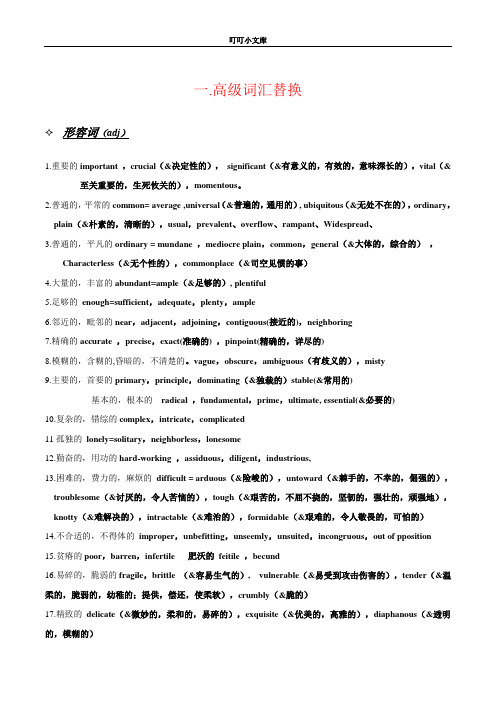
一.高级词汇替换形容词(adj)1.重要的important ,crucial(&决定性的),significant(&有意义的,有效的,意味深长的),vital(&至关重要的,生死攸关的),momentous。
2.普通的,平常的common= average ,universal(&普遍的,通用的), ubiquitous(&无处不在的),ordinary,plain(&朴素的,清晰的),usual,prevalent、overflow、rampant、Widespread、3.普通的,平凡的ordinary = mundane ,mediocre plain,common,general(&大体的,综合的),Characterless(&无个性的),commonplace(&司空见惯的事)4.大量的,丰富的abundant=ample(&足够的), plentiful5.足够的enough=sufficient,adequate,plenty,ample6.邻近的,毗邻的near,adjacent,adjoining,contiguous(接近的),neighboring7.精确的accurate ,precise,exact(准确的) ,pinpoint(精确的,详尽的)8.模糊的,含糊的,昏暗的,不清楚的。
vague,obscure,ambiguous(有歧义的),misty9.主要的,首要的primary,principle,dominating(&独裁的)stable(&常用的)基本的,根本的radical ,fundamental,prime,ultimate, essential(&必要的)10.复杂的,错综的complex,intricate,complicated11孤独的lonely=solitary,neighborless,lonesome12.勤奋的,用功的hard-working ,assiduous,diligent,industrious,13.困难的,费力的,麻烦的difficult = arduous(&险峻的),untoward(&棘手的,不幸的,倔强的),troublesome(&讨厌的,令人苦恼的),tough(&艰苦的,不屈不挠的,坚韧的,强壮的,顽强地),knotty(&难解决的),intractable(&难治的),formidable(&艰难的,令人敬畏的,可怕的)14.不合适的,不得体的improper,unbefitting,unseemly,unsuited,incongruous,out of pposition15.贫瘠的poor,barren,infertile 肥沃的feitile ,becund16.易碎的,脆弱的fragile,brittle (&容易生气的), vulnerable(&易受到攻击伤害的),tender(&温柔的,脆弱的,幼稚的;提供,偿还,使柔软),crumbly(&脆的)17.精致的delicate(&微妙的,柔和的,易碎的),exquisite(&优美的,高雅的),diaphanous(&透明的,模糊的)18.微妙的subtle(&精细的,敏感的),delicate(&精致的的,雅致的,柔和的,易碎的),tender(&温柔的,脆弱的,幼稚的;提供,偿还,使柔软),refined19.优雅的,高雅的elegant(&讲究的,简洁的),graceful (&优美的)20.巨大的big =massive(size, quantity, extent), colossol, tremendous,enormous,immense,gigantic21.公平的fair=impartial ,euitable,disinterested无私的冷漠的公正的22.合理的reasonable ,rational ,logical23.永恒的,永久的forever = perpetual,immutable,everlasting,eternal,permanent,immortal24.热情的enthusiasm = zeal, fervency25.平静的quiet = tranquil(&安宁的,稳定的),serene(calm and quiet),placid(&温和的,沉着的)26.昂贵的expensive=exorbitant,costly,exorbitant27.奢侈的luxurious(&丰富的,放纵的,特级的)=lavish(浪费的,丰富的,大方的), sumptuous(&华丽的,豪华的) ,extravagant(&浪费的,过度的,放纵的)28.华丽的magnificent(&宏伟的,壮丽的),luxuriant(&丰富的,繁茂的,肥沃的),gorgeous(灿烂的,极好的),ornate(文辞华丽的)29.无聊的,乏味的,单调的boring=tedious,tiresome,humdrum,Uninteresting30.陈腐的,守旧的fusty,mossy,stale(&不新鲜的,变旧,使变旧,尿),mouldy,hackneyed(&平庸的),conservative(&保守者),fossil(&化石),fogyish31.古老的,老旧的ancient=archaic,immemorial,antiquated(&过时的)32.寒冷的cold(&冷淡的)=chilly, icy(&冷淡的)33.炎热的hot=boiling,be burning hot,34.危险的,冒险的dangerous=perilous,hazardous,risky,35.现在,当前nowadays=currently36.流行的,盛行的popular,fashionable,epidemic(&传染性的),current(&流通的,最近的),vogue(&时髦的)37.独一无二的,特别的only=unique, distinctive,distinct(&清楚地,明显的),particular(&详细的,挑剔的),characteristic(&典型的)38.卓越的,非凡的remarkable= distinguished,prominent,brilliant,supernormal,extraordinary39.出名的,显著的famous = distinguished,noted,celebrated,famed40.明显的obvious=apparent,,manifest,distinct,evident,conspicuous41.值得注意的,显著的remarkable,noticeable,notable(&著名的)42. 相当地(程度)quite=fairly,43.彻底地,完全地fully,completely,throughly,sufficiently(&充分地,足够地),44.可怜的,可悲的,哀伤的pathetic,lamentable45.整个whole=entire,total46.潮湿的wet = moist, damp,humid47.错误的wrong=erroneous,inaccurate48.典型的,象征性的typical = quintessential精髓的49.小心的,谨慎的careful=cautious, prudent(careful and sensible)50.奇怪的,反常的strange=eccentric,odd,wacky。
大学英语四级作文句型四六级常用句型万能句经典句型
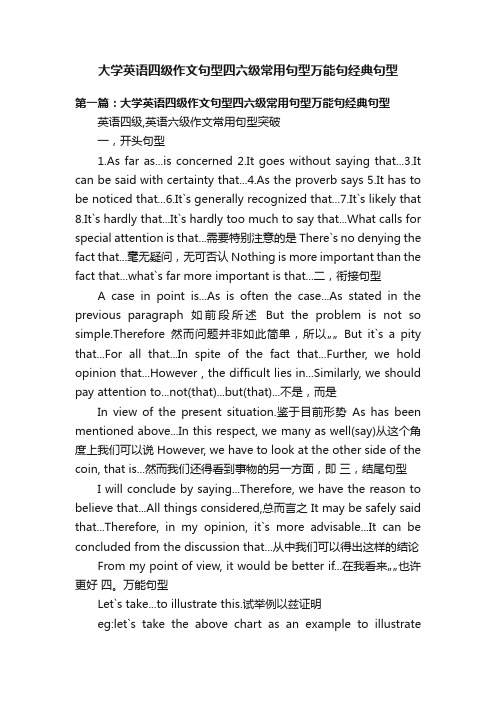
大学英语四级作文句型四六级常用句型万能句经典句型第一篇:大学英语四级作文句型四六级常用句型万能句经典句型英语四级,英语六级作文常用句型突破一,开头句型1.As far as...is concerned2.It goes without saying that...3.It can be said with certainty that...4.As the proverb says5.It has to be noticed that...6.It`s generally recognized that...7.It`s likely that8.It`s hardly that...It`s hardly too much to say that...What calls for special attention is that...需要特别注意的是 There`s no denying the fact that...毫无疑问,无可否认 Nothing is more important than the fact that...what`s far more important is that...二,衔接句型A case in point is...As is often the case...As stated in the previous paragraph如前段所述But the problem is not so simple.Therefore然而问题并非如此简单,所以…… But it`s a pity that...For all that...In spite of the fact that...Further, we hold opinion that...However , the difficult lies in...Similarly, we should pay attention to...not(that)...but(that)...不是,而是In view of the present situation.鉴于目前形势As has been mentioned above...In this respect, we many as well(say)从这个角度上我们可以说 However, we have to look at the other side of the coin, that is...然而我们还得看到事物的另一方面,即三,结尾句型I will conclude by saying...Therefore, we have the reason to believe that...All things considered,总而言之 It may be safely said that...Therefore, in my opinion, it`s more advisable...It can be concluded from the discussion that...从中我们可以得出这样的结论From my point of view, it would be better if...在我看来……也许更好四。
英语4级万能6级万能各10句另附100个词组
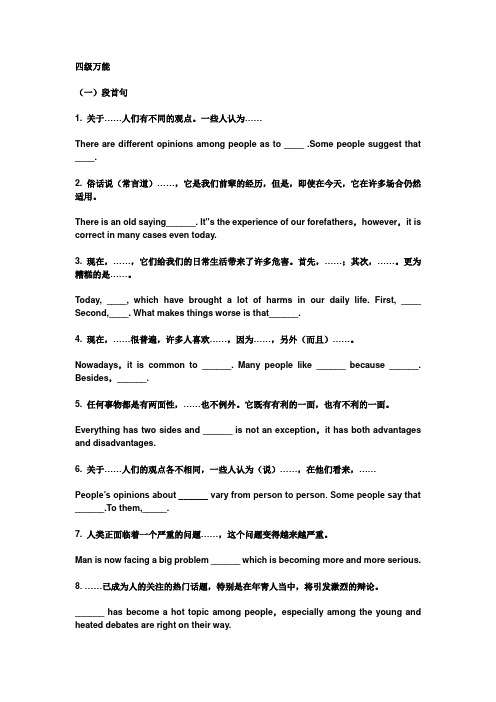
四级万能(一)段首句1. 关于……人们有不同的观点。
一些人认为……There are different opinions among people as to ____ .Some people suggest that ____.2. 俗话说(常言道)……,它是我们前辈的经历,但是,即使在今天,它在许多场合仍然适用。
There is an old saying______. It"s the experience of our forefathers,however,it is correct in many cases even today.3. 现在,……,它们给我们的日常生活带来了许多危害。
首先,……;其次,……。
更为糟糕的是……。
Today, ____, which have brought a lot of harms in our daily life. First, ____ Second,____. What makes things worse is that______.4. 现在,……很普遍,许多人喜欢……,因为……,另外(而且)……。
Nowadays,it is common to ______. Many people like ______ because ______. Besides,______.5. 任何事物都是有两面性,……也不例外。
它既有有利的一面,也有不利的一面。
Everything has two sides and ______ is not an exception,it has both advantages and disadvantages.6. 关于……人们的观点各不相同,一些人认为(说)……,在他们看来,……People’s opinions about ______ vary from person to person. Some people say that ______.To them,_____.7. 人类正面临着一个严重的问题……,这个问题变得越来越严重。
六级英语常用句型
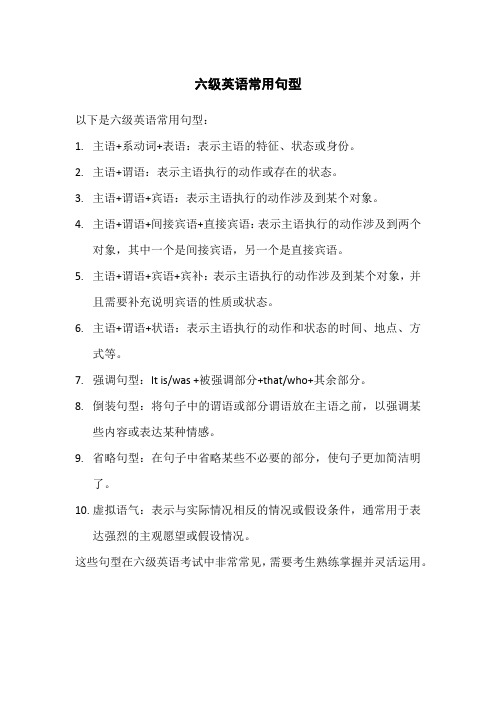
六级英语常用句型
以下是六级英语常用句型:
1.主语+系动词+表语:表示主语的特征、状态或身份。
2.主语+谓语:表示主语执行的动作或存在的状态。
3.主语+谓语+宾语:表示主语执行的动作涉及到某个对象。
4.主语+谓语+间接宾语+直接宾语:表示主语执行的动作涉及到两个
对象,其中一个是间接宾语,另一个是直接宾语。
5.主语+谓语+宾语+宾补:表示主语执行的动作涉及到某个对象,并
且需要补充说明宾语的性质或状态。
6.主语+谓语+状语:表示主语执行的动作和状态的时间、地点、方
式等。
7.强调句型:It is/was +被强调部分+that/who+其余部分。
8.倒装句型:将句子中的谓语或部分谓语放在主语之前,以强调某
些内容或表达某种情感。
9.省略句型:在句子中省略某些不必要的部分,使句子更加简洁明
了。
10.虚拟语气:表示与实际情况相反的情况或假设条件,通常用于表
达强烈的主观愿望或假设情况。
这些句型在六级英语考试中非常常见,需要考生熟练掌握并灵活运用。
- 1、下载文档前请自行甄别文档内容的完整性,平台不提供额外的编辑、内容补充、找答案等附加服务。
- 2、"仅部分预览"的文档,不可在线预览部分如存在完整性等问题,可反馈申请退款(可完整预览的文档不适用该条件!)。
- 3、如文档侵犯您的权益,请联系客服反馈,我们会尽快为您处理(人工客服工作时间:9:00-18:30)。
英语四六级作文基本句式£ £以下是短文写作中使用率最高、覆盖面最广的基本句式,每组句式的功能相同或相似,考生可根据自己的情况选择其中的 1-2个, 做到能够熟练正确地仿写或套用。
1.表示原因1 There are three reasons for this.2 The reasons for this are as follows.3 The reason for this is obvious.4 The reason for this is not far to seek.5 The reason for this is that. . .6 We have good reason to believe that. . .例如:There are three reasons for the changes that have taken place in o ur life. Firstly , people’s living standard has been greatly improved. Secondly , most people are well paid, and they can afford what they need or like . Last but not least, more and more people prefer to enjoy modern life.注:如考生写第一个句子没有把握,可将其改写成两个句子。
如: Great changes have taken place in our life. There are three reaso ns for this.这样写可以避免套用中的表达失误。
2.表示好处1 It has the following advantages.2 It does us a lot of good.3 It benefits us quite a lot.4 It is beneficial to us.5 It is of great benefit to us.例如:Books are like friends. They can help us know the world better, and they can open our minds and widen our horizons. Therefore , reading extensively is of great benefit to us.3.表示坏处1 It has more disadvantages than advantages.2 It does us much harm.3 It is harmfulto us.例如:However , everything dividesinto two. Television can also be harmful to us. I t can do harm to our health and make us lazy if we spend too muc h time watching televi- sion.4.表示重要、必要、困难、方便、可能1 It is important(necessary , difficult , convenient , possible for sb. to do sth.2 We think it necessary to do sth.3 It plays an important role in our life.例如:Computers are now being used everywhere, whether in the government, in schools or in business. Soon , computers will be found in ever y home, too . We have good reason to say that computers are playing an in creasingly important role in our life and we have stepped into the C omputer Age.5.表示措施1 We should take some effective measures.2 We should try our best to overcome(con quer the difficulties.3 We should do our utmost in doing sth.4 We should solve the problems that we are confronted(faced with .例如:The housing problem that we are confronted with is becoming mor e and more serious. Therefore , we must take some effective measures to solve it.6.表示变化1 Some changes have taken place in the past five years.2A great change will certainly be pro duced in the world’s communic ations .3 The computer has brought about many changes in education. 例如:Some changes have taken place in people’s diet in the past five ye ars . The major reasons for these changes are not far to seek. No wadays , more and more people are switching from grain to meat for protein , and from fruit and vegetable to milk for vitamins.7.表示事实、现状1 We cannot ignore the fact that. . .2 No one can deny the fact that. . .3 There is no denying the fact that. . .4 This is a phenomenon that many people are interested in.5 However , that’s not the&nb sp;case.例如:We cannot ignore the fact that industrialization brings with it the pr oblems of pollution. To solve these problems, we can start by ed ucating the public about the hazards of pollution. The government on its part should also design stricter laws to promote a cleaner en vironment .8.表示比较1 Compared with A, B . . .2 I prefer to read rather than watch TV.3 There is a striking contrast between them.例如:Compared with cars, bicycles have several advantages besides being affordable. Firstl y , they do not consume natural resources of petroleum. Secondly , they do not cause the pollution problem. Last but not least, they contribute to people’s health by giving them due physical exer cise .9.表示数量1 It has increased(decreased from . . . to . . .2 The population in this city has now increased (decreased to 800, 000.3 The output of July in this factory increased by 15% compared with that of January.例如:With the improvement of the liv ing standard, the proportion of people’s income spent on food has decreased while that spent on education has increased.再如:From the graph listed above , itcan be seen that student use of computers has increased from an average of less than two hours per week in 1990 to 20 hours in 20 00.注:“From the graph listed above,it can be seen that”见句式 12。
考生将句式 9 和句式 12 结合在一起,便可较好地写出 2002 年 6 月 CET -4、6 短文写作的第一段。
10.表示看法 1 ) People have ( take , adopt , assume ) different attitudes towards sth. 2)People have different opinions on this problem. 3)People take different views of(on)the question. 4)Some people believe that..Others argue that....例如: People have different attitudes towards failure.Some believe that failure leads to success. Every failure they experience translates into a greater chance of su ccess at their renewed endeavor.However, others are easily dis couraged by failures and put themselves into the category of loser s.再如:Do“lucky numbers reallybring good luck ?Different people have different views on it.注:一个段落有时很适宜以问句开始,考生应掌握这一写作方法。
